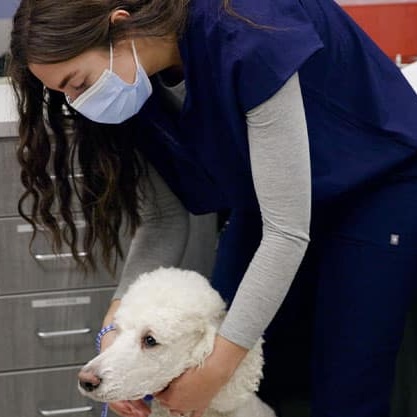Urgent Care
If you believe your pet is experiencing an urgent health situation, please call us immediately.
Urgent Care Hours:
Mon – Fri: 8:00 AM to 6:00 PM
Sat: 9:00 AM to 5:00 PM

Pets can be unpredictable, and you can’t plan for unexpected illness or injury. We understand that having a sick pet can be stressful, and you want them to feel better as soon as possible without a long wait at the emergency hospital. That’s where our urgent care services come in.

What is Veterinary Urgent Care?
Mercer Street Veterinary Hospital has a skilled team experienced at handling urgent cases, as well as the high-end specialty surgeries that such emergencies often require.
While we understand you may not always be in a position to call in advance, if you are able to do so it will help our staff be prepared for your pet’s arrival so he or she gets much-needed medical care that much sooner.
Our veterinarians are trained and capable in veterinary urgent care situations and can provide a high level of care for almost any urgency for dogs or cats. Occasionally, an emergency patient will need to be transferred to a hospital with an ICU once stabilized, or if they need overnight hospitalization. In these cases, we will organize the transfer and ensure your pet receives the best care possible.
Urgent Care Symptoms
Mercer Street Veterinary Hospital has a skilled team experienced at handling urgent cases, as well as the high-end specialty surgeries that such emergencies often require. Please call us right away for service 206-285-0395.
- Pale gums
- Rapid breathing
- Weak or rapid pulse
- Changes in body temperature
- Difficulty standing
- Apparent paralysis
- Loss of consciousness
- Seizures
- Excessive bleeding
- Pale gums
- Rapid breathing
- Weak or rapid pulse
- Changes in body temperature
- Difficulty standing
- Apparent paralysis
- Loss of consciousness
- Seizures
- Excessive bleeding
Urgent Care FAQs
What if my pet ate something poisonous?
In the event that your pet ingests something toxic, please contact us immediately or, if it is after business hours, reach out to the ASPCA Animal Poison Control Center’s 24-hour hotline at (888) 426-4435. Trained toxicologists will assess the situation based on your pet’s age, health, and what was ingested, and provide recommendations on the necessary action to take.
How should you approach a severely ill or injured pet?
When you come in for an appointment as an Essential Wellness Plan member, our team will review any medical recommendations for your pet, some may not be in the plan depending on your pet’s needs. You will not be charged for any services that are covered by the plan, but may have additional cost depending on services rendered.
How do you transport a dog who can't move?
How do you transport a cat who can't move?
What should you do if a wound is bleeding?

